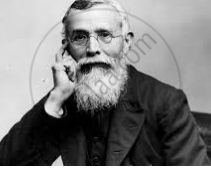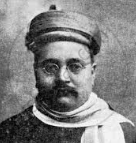Advertisements
Advertisements
Question
Read the extract given below and answer the questions that follow:
“… the Indians who actively worked for the creation of an all-India political organization represented new social forces that were increasingly opposed to the exploitation of India for British interests. They needed an organization that would fight for India’s political and economic advancement.”


From Freedom Struggle
Answer the following on the basis of above passage and pictures:
(i) In the context of the above, identify the two individuals in Pictures 1 and 2, who were the early leaders of the organization to be formed.
(ii) How did the person in Picture 1 explain the economic exploitation of India for British interest?
Solution
(i) The leaders given in picture 1 and picture 2 are Dada Bhai Naoroji and Gopal Krishna Gokhale respectively.
(ii) Through his famous ‘Drain Theory’ Dada Bhai Naoroji explained as to how India’ wealth is exploited for British interest in various forms such as:
(a) Salaries payable to the members of the India Council, (b) Dispatch of saving to England by British personnel posted in India, (c) Pensions to British Officers, (d) Payments to the war office for the maintenance of British troops in India.
APPEARS IN
RELATED QUESTIONS
The establishment of the Indian National Congress led to the development of the National Movement in India. In this context answer the following:
When was the Indian National Congress established? Who presided over its first session?
The establishment of the Indian National Congress led to the development of the National Movement in India. In this context answer the following:
What were the four aims of the Congress?
Why did the educated middle class people join the National Movement?
Name the British officer who promoted railway construction in India in the 19th century.
Name the Act of Lord Lytton’s regime, which aims at limiting the freedom of the Press.
Who was Mr. A.O. Hume? What was his contribution towards Indian Nationalism?
Why was the British Government friendly with the Congress in its initial stage?
Give any two reasons to indicate that the revolt of 1857 was an important landmark in India’s struggle for freedom.
There were various factors that promoted the growth of Nationalism in India in the 19th century. Give the meaning of ‘Nationalism’ in this context.
What was Lord Lytton’s Vernacular Press Act of 1878?
